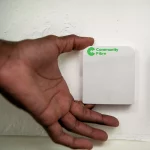Sponsored Links
UK Internet Users Raise IPv4 Internet Addresses Depletion Concerns
Posted: 11th Jul, 2011 By: MarkJ
 The results from 338 respondents (polled between Mid-June and July 2011) to our latest snap monthly survey has revealed that 39.3% are concerned about the imminent depletion of Internet Protocol version 4 ( IPv4 ) addresses and the impact that it could have upon their broadband connections.
The results from 338 respondents (polled between Mid-June and July 2011) to our latest snap monthly survey has revealed that 39.3% are concerned about the imminent depletion of Internet Protocol version 4 ( IPv4 ) addresses and the impact that it could have upon their broadband connections. An IPv4 address (e.g. '85.23.56.198') is assigned to your computer each time you go online. The address acts like a unique online identifier (not unlike a phone number) and allows you to communicate with other online computers, servers or websites.
Sadly you can only have a maximum of 4.3 Billion IPv4 addresses and these are rapidly running out. Adoption of its replacement ( IPv6 ) has so far proven to be painfully slow. Some fear that this could lead to a future of connectivity, performance and security problems because the two standards are not directly compatible.
Are you concerned about the imminent depletion of IPv4 Internet addresses?ISPreview.co.uk believes that it is now imperative for UK ISPs, especially big providers such as Sky Broadband (BSkyB) , BT , Virgin Media , O2 and TalkTalk , to start raising their customers' awareness. This should include a clear explanation of how they intend to address the problem on their own networks, which would go some way to allaying any confusion. A few have already done this.
No - 48.8%
Yes - 39.3%
What is IPv4? - 11.8%
Does your ISP currently support IPv6?
No - 40.8%
I don't know - 40.5%
Yes - 18.6%
Does your internet router or modem support IPv6?
No - 37.2%
I don't know - 36.9%
Yes - 25.7%
The good news is that ISPs can get around most of the problems inherent with IPv6 migration by running a dual-stack platform, which allows both the old and new standards to work almost seamlessly alongside each other. This solution costs money but it's likely to be the only viable fix for many years to come, at least until the old legacy IPv4 hardware and software is no longer used.
Meanwhile, this month's new survey asks how much broadband data (usage allowance) you consume per month (average) and whether or not you expect to increase your usage in the future? Vote Here.
Search ISP News
Search ISP Listings
Search ISP Reviews
Latest UK ISP News








Cheap BIG ISPs for 100Mbps+
150,000+ Customers | View More ISPs
Cheapest ISPs for 100Mbps+
Modest Availability | View More ISPs
Latest UK ISP News
Helpful ISP Guides and Tips
Sponsored Links
The Top 15 Category Tags
- FTTP (6722)
- BT (3863)
- Politics (3036)
- Business (2736)
- Openreach (2629)
- Building Digital UK (2488)
- Mobile Broadband (2434)
- FTTC (2132)
- Statistics (2102)
- 4G (2062)
- Virgin Media (1997)
- Ofcom Regulation (1761)
- 5G (1692)
- Fibre Optic (1587)
- Wireless Internet (1581)
Sponsored
Copyright © 1999 to Present - ISPreview.co.uk - All Rights Reserved - Terms , Privacy and Cookie Policy , Links , Website Rules






























